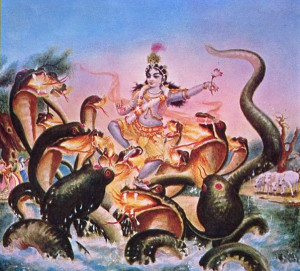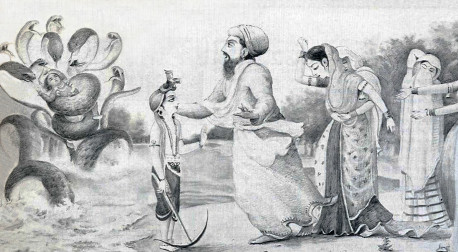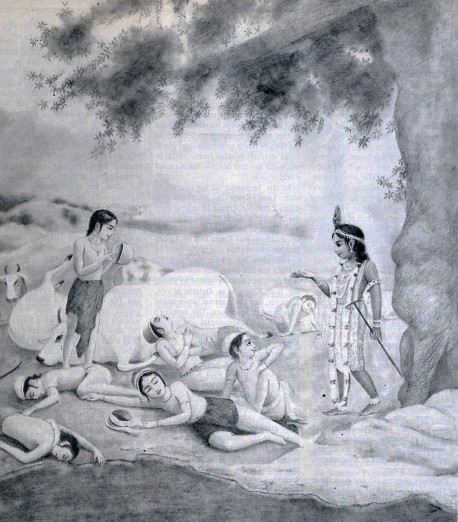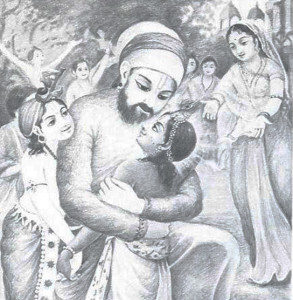by Satsvarupa dasa Goswami

The narrative of Krsna and Kaliya, as described in the Krsna Book, Volume One, by His Divine Grace A.C. Bhaktivedanta Swami Prabhupada, vividly illustrates that Lord Sri Krsna is the Supreme Personality of Godhead, the complete Absolute Truth. The Krsna book is a summary study of the Vedic scripture Srimad-Bhagavatam, in which the pastimes of Krsna are fully described. Many people disbelieve that these narrations of Krsna are revelations of transcendental knowledge. They say that the activities of Krsna are stories about a mythical figure or ordinary historical person. A mistaken description of Krsna in terms of this idea recently published in Time magazine stated that the devotees of Krsna worship Him as one of many gods and hope eventually to go beyond Krsna, and all other gods, to realize the Absolute Truth as the impersonal Absolute, or Brahman. This mistaken conclusion, however, has nothing to do with the Vedic literatures or the great philosophers and spiritual masters of Krsna consciousness. The scripture Vedanta-sutra explains that the Absolute Truth, the Supreme Personality of Godhead, Krsna, is janmady asya yatah, the source of everything.

In Bhagavad-gita Krsna Himself states, “Everything emanates from Me” (Bg. 10.8) and “I am the basis of the impersonal Brahman” (Bg. 14.27). The Srimad-Bhagavatam describes that the Supreme Person is the highest aspect of the Absolute Truth and that the impersonal infinite is subordinate to Him, as sunshine is subordinate to the sun. The Supreme Person is greater than the all-pervading, impersonal aspect of spiritual truth. Another authoritative Vedic literature, the Brahma-samhita describes Krsna to be the supreme controller whose transcendental body is eternal, full of bliss and knowledge. Everything is sustained by His inconceivable energies. Therefore, the highest truth is the Supreme Person.
But when this inconceivable, all-pervading Absolute Truth, Krsna, by His mercy appears in human society to attract the fallen souls, fools deride Him. Krsna Himself states in Bhagavad-gita, “Fools deride Me when I appear in the human form. They do not know My transcendental nature and My supreme dominion over all that be.” (Bg. 9.11) Sometimes people give lip service to the idea that God is inconceivable and capable of anything and everything, but when He actually appears before them and shows just a small fragment of His infinite energy, they reject His activities and say that it is impossible for God to appear as a person. But we must. ask such skeptics why, if God is all-powerful, it is not possible for Him to appear here and engage in transcendental pastimes with His own devotees. What is to prevent Krsna from coming? We may disbelieve in Him, but we cannot stop Him.
Spiritual authorities all conclude that God is a person, and because His personality is infinite, for Him anything is possible. He is not void or zero. Even ordinary living entities have personalities and activities, so how can God, who is the source of everything, be without form or personality? One should understand that His form is not material or limited like ours, and therefore when He appears in human society in His original form of Krsna, one should worship Him, not reject Him like the fools who say that Krsna is less than the impersonal Brahman. Of course, this is a simple matter of knowing the spiritual facts. Only one who is ignorant of the spiritual science will deride Krsna, not understanding that He is the Supreme Person. One should not, therefore, hear about the pastimes of Krsna from skeptics but from the lips of a pure devotee of Krsna, for in that way one can derive the highest benefit. The Krsna Book is unique because it is a presentation of the pastimes of Krsna by a pure devotee of Krsna, His Divine Grace A.C. Bhaktivedanta Swami Prabhupada.
Here is a sample from the Krsna Book that shows the actual transcendental atmosphere of Krsna’s pastimes: “When Krsna, Balarama and Their friends entered the village of Vrndavana, They played Their flutes, and the boys praised Their uncommon activities in the forest. Krsna’s head was decorated with a peacock feather. Both He and Balarama played Their flutes, and the young gopis (cowherd girls) were joyous to see Krsna returning home. All the gopis in Vrndavana remained very morose on account of Krsna’s absence. All day they were thinking of Krsna in the forest or of Him herding cows in the pasture. When they saw Krsna returning, all of their anxieties were immediately relieved, and they began to look at His face the way drones hover over the honey of a lotus flower. When Krsna entered the village, the young gopis smiled and laughed.”
In this way, Krsna, the inconceivable cause of all causes, plays in Vrndavana as a cowherd boy for the pleasure of His pure devotees, the cowherd men and gopis. These are the actual activities of the spiritual world, and the perfection of appreciating these pastimes is far beyond that of meditating on a void or impersonal Absolute. When we appreciate Krsna in this mood, we will best understand the significance of this narrative of Krsna and the Kaliya snake.

Sometimes Krsna used to go with His boy friends and His brother, Balarama, to the bank of the Yamuna to tend the cows. One summer, when all the boys and cows were in the field, they became very thirsty and began to drink the water of the Yamuna. The river, however, had been poisoned by the venom of the great serpent Kaliya, and the boys and cows who drank from it suddenly fell down, apparently dead, on the ground.
Krsna, the life of all that lives, simply cast His merciful glance over all the boys and cows, and they at once regained consciousness and began to look at each other with great astonishment. They could understand that by drinking the water of the Yamuna they had died and that the merciful glance of Krsna had restored their lives.
It is mentioned in the Krsna Book that when this incident was originally related by Sukadeva Gosvami his disciple, Maharaja Pariksit, was eager to hear about the pastimes of Krsna. A pure devotee knows that nothing is difficult for Krsna, including even reviving the dead to life. Krsna’s inconceivable nature is infinite, beyond our ever understanding it completely. But the symptom of one who is advanced in Krsna consciousness is that he becomes more and more absorbed in relishing the Lord’s pastimes and always wishes to hear further.
The boys had died because the Yamuna had been thoroughly poisoned by the black serpent Kaliya. The grass near the river bank had all dried up, and the river was so contaminated that it emanated a poisonous vapor twenty-four hours a day. If a bird even passed over the river, it would immediately fall dead into the water.
Krsna’s mission in this material world is to vanquish all undesirable elements; therefore, He climbed up a tree on the bank of the Yamuna, tightened His belt and jumped into the poisonous river. When Krsna jumped into the water, the river overflooded its banks as if something very large had fallen into it. Hearing the great noise made by Krsna in the water, the serpent Kaliya understood that someone was attacking his home. Coming before Krsna, he saw Him to be delicate and beautiful, His bodily hue resembling a fresh rain cloud. Krsna was smiling and playing in the river with great strength because He is the source of all strength. But Kaliya felt anger within his heart, and thus he grabbed Krsna with his coils.
Seeing Krsna in the coils of the serpent, Krsna’s friends the cowherd boys and the other residents of Vrndavana were stunned with fear. Krsna was their whole life. When they saw Him apparently overpowered by the coils of the serpent, they lost all composure and fell to the ground. Krsna’s personal associates and family members are understood to have been the most exalted persons in the universe. Having given up all material desires and gone beyond all speculation or impersonal understanding of the Absolute Truth, they became so qualified by dint of their previous pious activities that they were even allowed to play with Krsna. They regarded Him not as the Almighty Godhead but as the dearmost friend in existence. They thought of Krsna as their master, friend, son or lover.
Ordinary persons do not even think of God, not to speak of lamenting for the Supreme Personality of Godhead when He appears to be in distress. Mostly we lament over our own bodily or mental distress or some distress that affects our friends and relatives. In other words, our feelings are based not on pure love but on sense gratification. Making the mistake of thinking that the body is the self, we are happy when we are able to please the bodily senses, and we become unhappy when there is some disruption to that sense pleasure. But there is no real satisfaction in sense gratification because it is always hampered by the miseries of birth, old age, disease and death.
The associates of Krsna, however, always focused all their emotions on Krsna, and therefore they were eternally liberated. There was no question of their ever forgetting Him; rather, they forgot all selfish material desires. And one who always remembers Krsna in this way is qualified to transfer at the time of death to the spiritual world in an eternal, blissful form, never to return for another birth in the material world.
In the beginning of his discussion with Lord Krsna in Bhagavad-gita, Krsna’s disciple Arjuna lamented over the impending death of his bodily relatives. This is an example of material lamentation. But Krsna said to Arjuna that his lamentation was not worthy of a wise man, for a wise man laments neither for the living nor the dead. A pure devotee’s anxiety caused by thinking that Krsna is in distress is not, however, like the material lamentation of a man in ignorance. The devotee’s emotion is transcendental and purifying because it is in relationship with Krsna. There is no question of danger or distress for Krsna, the Supreme Godhead. Therefore, Krsna’s appearing to be in difficulty with Kaliya was a pretense, but His devotees’ anxiety for Him was a transcendental emotion.
Not only Krsna’s friends but also the cows and calves were overwhelmed with grief as they saw Krsna gripped tightly in the clutches of the serpent. Unable to help, they could only cry in great anxiety. Meanwhile, nature manifested ill omens. The earth trembled, and meteors fell from the sky. When Krsna’s mother and father, Yasoda and Nanda, were informed that Krsna had gone to the pasturing grounds without His older brother, Balarama, they were filled with anxiety because they were unaware of Krsna’s supreme potency. They ran to the Yamuna, fearful that Krsna might be vanquished by Kaliya. In a short time all the residents of Vrndavana—children, young men, old men, women, animals and all living entities—had gathered on the bank of the Yamuna. All of the residents of Vrndavana were pure devotees of Krsna who did not know anything but Him. They knew that He was their only means of sustenance. Seeing Krsna caught in the coils of the snake, they felt lost. When mother Yasoda arrived at the bank of the Yamuna, she immediately tried to plunge into the river, but she was stopped by the residents of Vrndavana. Only Krsna’s brother, Balarama, who was the master of knowledge, knew what was actually happening. He did not grieve but simply stood there smiling. He knew how powerful His younger brother Krsna was; there was no cause for anxiety over Krsna’s fighting with an ordinary serpent of the material world.
For two hours, Krsna remained like an ordinary child gripped in the coils of the serpent. One may ask why Krsna allowed His dearest associates to be put into such anxiety for such a long time. This question can only be answered in terms of the intimate transcendental relationship between Krsna and His devotees. An atheist cannot expect to poke his nose into the sublime exchanges between Krsna and His devotees and understand them. Only a devotee who is simply absorbed in love for Krsna and does not seek any reward can fully understand these pastimes. As Lord Krsna states in Bhagavad-gita, “Only by devotional service am I to be known.” (Bg. 18.55)
Devotees of Krsna can appreciate that Krsna performed these pastimes with the Kaliya snake to give impetus to intensified feelings of love for Him. Seeing Krsna in trouble, the devotees in Vrndavana became absorbed in remembering Krsna His smiling face, His loving words and His dealings with the various demons He had vanquished. The devotees on the bank of the Yamuna, therefore, demonstrated the highest stage of Krsna consciousness the ecstasy of love in a feeling of separation. Krsna did not want to disturb their mood of concern and anxiety for Him by immediately showing them that there was no need for distress. Therefore He remained wrapped in the serpent’s coils.
Lord Krsna reciprocates and intensifies the love of His devotees. When Krsna first appeared as a small baby, He allowed His father, Vasudeva, to carry Him across the River Yamuna as His protector. Because Vasudeva was absorbed in the mood of protecting Krsna, Krsna allowed Himself to be in need of protection. Similarly, when Krsna was dancing with the cowherd girls, at the height of their loving affairs He disappeared from the rasa dance, causing them to become mad with lamentation. They wandered throughout Vrndavana Forest searching for Him, feeling intense love in separation from Krsna. And when Krsna was sixteen years old, He left Vrndavana altogether, and thus all the residents of Vrndavana, including the gopis, mother Yasoda and His father Nanda, remained in grief over His absence for the rest of their lives. But by always talking about Krsna, chanting His holy name and remembering Krsna, they were able to feel the same love as when He was present in Vrndavana. Because Krsna is absolute, remembrance of Krsna is the same as direct association with Him. Therefore Lord Caitanya prayed, “I do not know anyone but Krsna as my Lord, and He shall always remain as such, even if He handles me roughly in His embrace or makes me broken-hearted by not being present before me.”
When Lord Krsna saw that all the inhabitants of Gokula, having no other recourse than Him, were practically dead with grief, He made an immediate move to free Himself. Krsna expanded His body within the coils of the Kaliya snake, and because of the strain, the snake’s coils slackened, and he was forced to release Krsna. He became very angry, expanding his hoods and exhaling poisonous fumes from his nostrils. Krsna pounced upon him, and the two began moving in a circle. The snake tried to bite Krsna, but Krsna pressed the serpent down and then jumped up on top of his hoods. Then Krsna, the original master artist of all fine arts, such as dancing, began to dance upon the hoods of the serpent while the hoods moved to and fro. At that time the Lord’s lotus feet became tinged with red from the rays of the jewels on the snake’s hoods. As Krsna danced on the hoods of the snake, the residents of the upper planets rejoiced and began to celebrate with showers of flowers, beating of drums and singing of songs.
The sublime climax of Krsna’s fight with the Kaliya snake has been depicted by devotee artists [see this month’s front cover]. Completely self-assured and transcendental to all danger, Krsna is seen vanquishing the hundred-headed serpent by gracefully dancing upon his hoods in the midst of the turbulent River Yamuna. By smashing the serpent’s heads with His lotus feet, Krsna at the same time bestowed the highest benediction upon Kaliya, for by touching the snake with His holy lotus feet, the shelter of all the worlds, which are sought after by His pure devotees, Krsna released Kaliya from his sins. The snake became gradually reduced in strength and began to throw up poisonous materials. It appeared as if the Supreme Personality of Godhead were being worshiped and the poison emanating from the mouth of the serpent were flower offerings. Then Kaliya, now vomiting blood instead of poison, appearing to be almost dead, finally began to realize that Krsna was the Supreme Personality of Godhead.
At that time, the wives of the serpent, known as the Nagapatnis, appeared before Krsna with folded palms and prayed to the Lord to forgive their husband. Recognizing the actual position of Krsna, they addressed Him as the Absolute Truth and expressed the understanding that there is no difference between Krsna’s mercy and punishment. They could understand that the apparent punishment inflicted upon their husband Kaliya was actually a benediction because his sins were eradicated by the kicks of Krsna’s dancing feet on his heads. They declared that Kaliya must have performed greatly pious acts in his past life to get the opportunity to be touched by Krsna’s lotus feet. They were perplexed, for although the Kaliya snake, having the body of a serpent, must have been very sinful, he was so extraordinarily fortunate that the Lord’s lotus feet touched his hoods.
They prayed, “O dear Lord, we are simply astonished to see that he is so fortunate as to have the dust of Your lotus feet on his head. This is a fortune sought after by great saintly persons. Even the goddess of fortune underwent great austerities just to have the blessing of the dust of Your lotus feet, so how is it that Kaliya is so easily getting this dust on his head?”
The Nagapatnis appeared well versed in the conclusion of Vedic literature because they understood that Krsna is the cause of all causes. “You are the ultimate goal of all philosophical efforts,” they declared, “and You are actually described by all philosophies and by different kinds of doctrines. Let us offer our respectful obeisances unto You because You are the origin of all scriptures and the source of all knowledge. You are the Supreme Personality of Godhead. You can bestow upon us the supreme knowledge. You are also the supreme enjoyer.”
Fully acquainted with the Vedic literature, the Nagapatnis knew that Krsna is the ultimate goal in the search for the Absolute Truth. They were also chaste wives who could not live without their husband, and so they prayed unto the Supreme Lord to spare Kaliya. “Our dear Lord,” they said, “every living creature is Your offspring, and You maintain everyone. This serpent is also Your offspring, and You can excuse him although he has offended You, undoubtedly without knowing Your potency.” They concluded, “Every living entity can be relieved from all kinds of despair if he agrees to abide by Your orders.”
Thereafter Kaliya himself, having come to his senses because of the kicks of Krsna’s lotus feet, also offered prayers. He expressed that it was very difficult for him to give up his envious instincts, for they were natural to his snakelike body. Although the real self is not the body but spirit soul and it has an eternal loving service relationship with God, or Krsna, even human beings think that they are American, African, black, white and so on in terms of the bodies that they have obtained. As stated in Bhagavad-gita, the illusion of material nature is strong, and to revive one’s memory of one’s relationship with Krsna is difficult. Kaliya, therefore, begged that Krsna excuse him for his inevitable material tendencies. He said to Krsna, “Now You can punish me or save me as You desire.”

After hearing this, the Supreme Personality of Godhead, who was acting as a small human child, ordered the serpent, “You must immediately leave this place and go to the ocean. Leave without delay. You can take with you all your offspring, wives and everything that you possess. Don’t pollute the water of the Yamuna. Let it be drunk by My cows and cowherd boys without hindrance.” The Lord then declared that the order given to the snake should be recited and heard by everyone so that no one need fear Kaliya any longer.
Krsna was very pleased with Kaliya and His wives. After hearing His order, the wives worshiped the Lord with offerings of garments, garlands, jewels, sandalwood, lotus flowers and palatable foods. Then, obeying the orders of Lord Krsna, they all left the waters of the Yamuna. When Krsna finally came out of the river, He was seen by all His friends and relatives on the bank of the Yamuna. He was decorated with jewels, and all the inhabitants of Vrndavana felt as if they had recovered their lives on seeing Krsna again. They each in turn pressed Krsna to their chests and felt great relief. They were so happy that they felt they had achieved the ultimate goal of life.
According to the Vedic literature, the anxiety of our life in the material world can be alleviated simply by hearing these pastimes of Lord Krsna from the lips of a pure devotee. The effect of hearing about Krsna is that one becomes absorbed in the eternal, blissful world and forgets his illusory engagements in this world of death, disease and old age. Many such pastimes of Krsna are in the Krsna Book, which describes the activities of Krsna’s childhood, boyhood and youth in Vrndavana. Later, near the end of His pastimes in this world, Krsna, as a prince on the Battlefield of Kuruksetra, spoke the superb transcendental philosophy of Bhagavad-gita. Lord Caitanya, the ideal preacher of Krsna consciousness, has said, yare dekha, tare kaha ‘krsna’-upadesa: “Whomever you meet, speak to him about Krsna or tell him about the philosophy of Krsna.” To follow this order is to bestow the highest mercy on others, and at the same time, whoever speaks of such pastimes of Krsna will also derive the highest pleasure. Many people in this age are too dull to give a patient hearing to Krsna consciousness, but whoever can hear about Krsna is pious, and whoever can seriously understand and relish the pastimes of Krsna is the most fortunate person on earth. Such a person is eternally liberated from all distresses, and he becomes eligible to enter the kingdom of God.

Excellent!